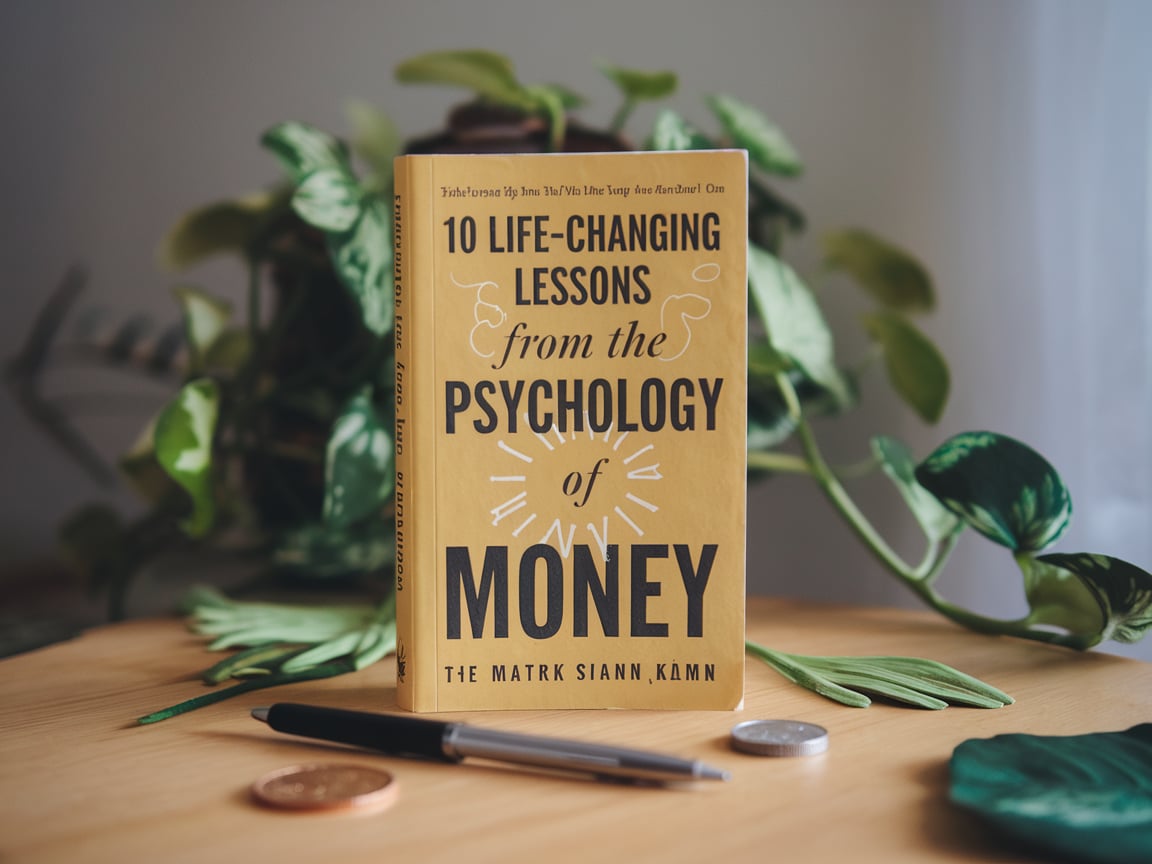10 Life-Changing Lessons from The Psychology of Money

Discover 10 powerful lessons from The Psychology of Money by Morgan Housel that will change the way you think about wealth, investing, and financial freedom. Money isn’t numbers—it’s behavior, emotions, and thinking long-term. In The Psychology of Money, Morgan Housel uncovers how our wealth is more about our mindset than our income or IQ.

Below are 10 life-altering The Psychology of Money lessons that can change the way you handle wealth and make financial choices:
1. Wealth Is What You Don’t See
One of the most important The Psychology of Money takeaways is that real wealth is not flashy. Most people believe that wealth equates to costly cars, high-end fashion, and high-priced vacations. Yet Housel is quick to point out that actual wealth is in plain sight—it’s the cash you save and invest, not the cash you spend.
Key Takeaway: Accumulate wealth by saving and investing, rather than flaunting your income.
2. The Power of Compounding
Housel points out that time is your greatest financial strength. Even tiny sums of money, if invested regularly, can accumulate enormously over time. Warren Buffett’s wealth is a case in point—his wealth accumulated huge because he began investing early.
Key Takeaway: Invest early and let compounding magic happen.
3. Luxury Is Not More Important Than Financial Freedom
One of the most critical The Psychology of Money takeaways is that money needs to provide you with mastermastery of your time, not merely luxuries. Financial independence to be able to work in your style and make decisions without worrying about money is infinitely better than holding luxury items.
Key Takeaway: Choose financial independence over a lavish lifestyle.
4. Luck and Risk Plays a Greater Role Than We Realize
Wealth (and success) in finance (and in life) isn’t all about brains and hard work. Luck and risk always play a part. A few folks get wealthy because of good fortune, while others lose money because of poor luck.
Key Takeaway: Be humble regarding your own wealth and don’t judge others for theirs.
5. Don’t Inflate Your Lifestyle
A pitfall many make is spending more as income increases. This is referred to as lifestyle inflation—purchasing bigger houses, nicer cars, and other useless extravagances rather than saving and investing. Housel cautions that this thinking traps individuals in financial stress even with increased income.
Key Takeaway: Live beneath your means and invest your excess money for long-term security.
6. You Don’t Need to Be a Financial Expert to Build Wealth
One of the most comforting The Psychology of Money takeaways is that you don’t have to use complicated strategies to succeed with money. People think they need to forecast the stock market or be an expert in advanced money theories, but Housel counters that basic, persistent routines perform best.
Key Takeaway: Save on a regular basis, invest in index funds, and concentrate on long-term money development.
7. Don’t Make Emotional Money Choices
Fear and greed cause individuals to make lousy financial decisions. Investors sell out during market downturns and at a loss, then buy at the high—theirs will be poor returns. Housel emphasizes that emotional choice is one of the greatest challenges to financial success.
Key Takeaway: Adhere to a long-term financial plan and don’t act emotionally on market fluctuations.
8. Savings Give You Freedom and Flexibility
Saving isn’t only about buying large items—it’s about having the ability to make life decisions without worrying about money. Whether it’s changing careers, going on a sabbatical, or covering emergencies, a solid savings buffer provides flexibility.
Key Takeaway: Accumulate savings not only for objectives, but for the comfort it brings.
9. The Market Will Always Be Volatile—Stay Invested
Another crucial The Psychology of Money lesson is that the stock market is unpredictable. Many people try to time the market, but even experts fail at consistently predicting short-term movements. Instead, Housel advises investors to **stay invested for the long term** and ignore short-term volatility.
Key Takeaway: Invest with a long-term mindset and avoid reacting to short-term market fluctuations.
10. Peace of Mind Is Money’s Biggest Value
In the end, money is not only about numbers—it’s about happiness, freedom, and security. Perhaps one of the most important The Psychology of Money takeaways is that it’s not about amassing more money—it’s about feeling secure and in charge of your financial future.
Key Takeaway: Use money as a means to design a stress-free, rich life.
Conclusion
Using these The Psychology of Money principles, you can create long-term wealth, steer clear of typical financial pitfalls, and enjoy more financial freedom.
What lesson stuck with you the most? Share with us in the comments!
📖 Get Your Copy of “The Psychology Of Money”: Click Here
Follow us on Instagram for more book related updates. @akshar_books

